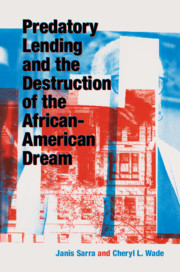Book contents
- Predatory Lending and the Destruction of the African-American Dream
- Predatory Lending and the Destruction of the African-American Dream
- Copyright page
- Dedication
- Contents
- Figures
- Tables
- Foreword
- Acknowledgements
- 1 Introduction
- 2 Foreclosure: At What Cost and to Whom?
- 3 Predatory Lending Practices Prior to the Global Financial Crisis
- 4 Predatory Lending Targeted African Americans
- 5 The Implications of the Collapse of the Mortgage-backed Securities Market for Consumer Borrowers
- 6 A Missed Opportunity
- 7 Financial Crisis Reforms Woefully Inadequate
- 8 Incomplete Justice: Legal Actions against Predatory Lenders
- 9 A Sub-prime Loan by Any Other Name Is Just as Predatory
- 10 “Forgiveness” rather than Forbearance or Foreclosure
- Appendix
- Index
10 - “Forgiveness” rather than Forbearance or Foreclosure
Published online by Cambridge University Press: 22 June 2020
- Predatory Lending and the Destruction of the African-American Dream
- Predatory Lending and the Destruction of the African-American Dream
- Copyright page
- Dedication
- Contents
- Figures
- Tables
- Foreword
- Acknowledgements
- 1 Introduction
- 2 Foreclosure: At What Cost and to Whom?
- 3 Predatory Lending Practices Prior to the Global Financial Crisis
- 4 Predatory Lending Targeted African Americans
- 5 The Implications of the Collapse of the Mortgage-backed Securities Market for Consumer Borrowers
- 6 A Missed Opportunity
- 7 Financial Crisis Reforms Woefully Inadequate
- 8 Incomplete Justice: Legal Actions against Predatory Lenders
- 9 A Sub-prime Loan by Any Other Name Is Just as Predatory
- 10 “Forgiveness” rather than Forbearance or Foreclosure
- Appendix
- Index
Summary
Chapter 10 turns to a normative discussion on how we should approach default for home borrowers. It explores whether there is space for a paradigm shift, a complete reconceptualization of mortgage lending, terms and conditions, responses leading up to and upon default, and prevention of foreclosures. It examines whether the law can be responsive to contemporary developments in mortgage lending, and whether it can be designed to recognize the legacy of racism in its application. It considers the dissonance between the oft-stated public policy goals of U.S. governmental agencies regarding home ownership and the policies and practices they have sanctioned on the ground. The chapter also examines, in the face of a regulatory lacuna, the need for more effective corporate governance of financial institutions and considers whether the investment community that is concerned with environmental, social and governance factors could be enlisted to pressure mortgage originators and servicers to remedy their conduct. Socially responsible investors could meaningfully shift the trajectory of financial markets in respect of mortgage lending by exercising their investment power.
- Type
- Chapter
- Information
- Publisher: Cambridge University PressPrint publication year: 2020



